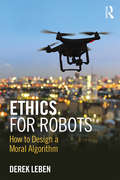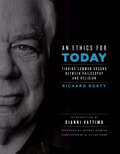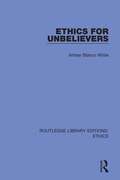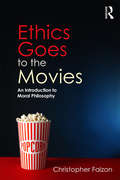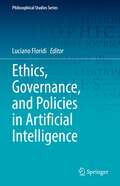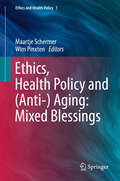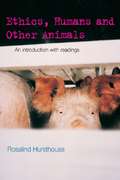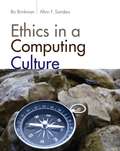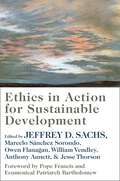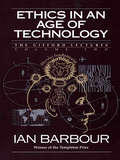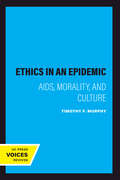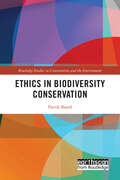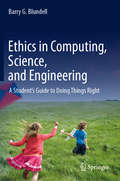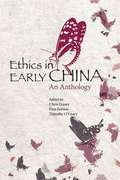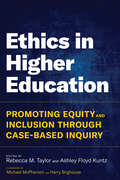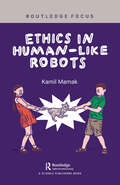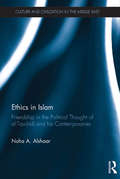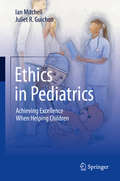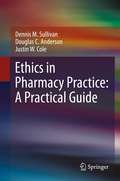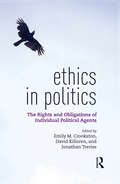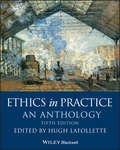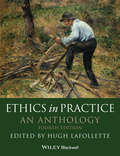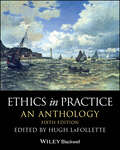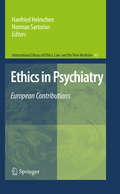- Table View
- List View
Ethics for Robots: How to Design a Moral Algorithm
by Derek LebenEthics for Robots describes and defends a method for designing and evaluating ethics algorithms for autonomous machines, such as self-driving cars and search and rescue drones. Derek Leben argues that such algorithms should be evaluated by how effectively they accomplish the problem of cooperation among self-interested organisms, and therefore, rather than simulating the psychological systems that have evolved to solve this problem, engineers should be tackling the problem itself, taking relevant lessons from our moral psychology. Leben draws on the moral theory of John Rawls, arguing that normative moral theories are attempts to develop optimal solutions to the problem of cooperation. He claims that Rawlsian Contractarianism leads to the ‘Maximin’ principle – the action that maximizes the minimum value – and that the Maximin principle is the most effective solution to the problem of cooperation. He contrasts the Maximin principle with other principles and shows how they can often produce non-cooperative results. Using real-world examples – such as an autonomous vehicle facing a situation where every action results in harm, home care machines, and autonomous weapons systems – Leben contrasts Rawlsian algorithms with alternatives derived from utilitarianism and natural rights libertarianism. Including chapter summaries and a glossary of technical terms, Ethics for Robots is essential reading for philosophers, engineers, computer scientists, and cognitive scientists working on the problem of ethics for autonomous systems.
An Ethics for Today: Finding Common Ground Between Philosophy and Religion
by Richard RortyRichard Rorty is famous, maybe even infamous, for his philosophical nonchalance. His groundbreaking work not only rejects all theories of truth but also dismisses modern epistemology and its preoccupation with knowledge and representation. At the same time, the celebrated pragmatist believed there could be no universally valid answers to moral questions, which led him to a complex view of religion rarely expressed in his writings.In this posthumous publication, Rorty, a strict secularist, finds in the pragmatic thought of John Dewey, John Stuart Mill, William James, and George Santayana, among others, a political imagination shared by religious traditions. His intent is not to promote belief over nonbelief or to blur the distinction between religious and public domains. Rorty seeks only to locate patterns of similarity and difference so an ethics of decency and a politics of solidarity can rise. He particularly responds to Pope Benedict XVI and his campaign against the relativist vision. Whether holding theologians, metaphysicians, or political ideologues to account, Rorty remains steadfast in his opposition to absolute uniformity and its exploitation of political strength.
An Ethics for Today: Finding Common Ground Between Philosophy and Religion
by Richard RortyOne of the most widely discussed philosophers of the 21st century finds common ground between spiritual and secular ethics in this provocative book.As controversial and he was influential, Richard Rorty developed a brand of philosophical pragmatism that rejects all theories of truth. His groundbreaking work also dismisses modern epistemology and its preoccupation with knowledge and representation. Though he was a strict secularist, Rorty believed there could be no universally valid answers to moral questions. This led him to a surprisingly complex view of religion rarely expressed in his writings. In this posthumous publication, Rorty finds in the pragmatic thought of John Dewey, John Stuart Mill, William James, and George Santayana, among others, a political imagination shared by religious traditions. Rather than promote belief or nonbelief, Rorty seeks to locate patterns of similarity and difference so an ethics of decency and a politics of solidarity can rise. He particularly responds to Pope Benedict XVI and his campaign against the relativist vision. Whether holding theologians, metaphysicians, or political ideologues to account, Rorty remains steadfast in his opposition to absolute uniformity and its exploitation of political strength.
Ethics for Unbelievers
by Amber Blanco WhiteOriginally published in 1949, this book examines the problems of morals in the light of science and philosophy and is addressed to those who do not accept revelation as the sanction for morality. The book discusses the individual, and in particular the origin and nature of conscience as well as society and communal codes of behaviour.
Ethics Goes to the Movies: An Introduction To Moral Philosophy
by Christopher FalzonMovies hold a mirror up to us, portraying the complexities of human reality through their characters and stories. And they vividly illustrate moral theories that address questions about how we are to live and what sort of people we ought to be. In this book, Christopher Falzon uses movies to provide a rich survey of moral positions as they have emerged through history. These include the ethics of the ancient world, medieval ethics, Enlightenment and Kantian ethics, existentialist ethics and the ethics of the other. Each theory is explained in detail, using a number of examples from the book’s wide selection of movies. The discussion draws on a range of recent and not-so-recent films, from Hollywood blockbusters to art-house cinema.
Ethics, Governance, and Policies in Artificial Intelligence (Philosophical Studies Series #144)
by Luciano FloridiThis book offers a synthesis of investigations on the ethics, governance and policies affecting the design, development and deployment of artificial intelligence (AI). Each chapter can be read independently, but the overall structure of the book provides a complementary and detailed understanding of some of the most pressing issues brought about by AI and digital innovation. Given its modular nature, it is a text suitable for readers who wish to gain a reliable orientation about the ethics of AI and for experts who wish to know more about specific areas of the current debate.
Ethics, Health Policy and (Anti-) Aging: Mixed Blessings
by Wim Pinxten Maartje SchermerThis volume focuses on the ethical and philosophical issues that arise in an aging society, and the implications of these issues for healthcare and social policy. After a brief overview of biomedicine's changing approach of ageing and longevity and of the new expectations that these changes generate, various ethical, social, and policy issues that surround aging and longevity are discussed. First, the images and social meanings of aging and old age in our society are explored, including their normative dimensions and implications for policy. Next, ethical issues in the care for frail elderly are discussed, as well as notion of good care and end-of-life decisions. Finally, the ethical and social implications of emerging possibilities for anti-aging and lifespan extension are considered. The book concludes with an overview of the relevance of the issues discussed for policy making on professional, national and international levels.
Ethics, Humans and Other Animals: An Introduction with Readings (Philosophy and the Human Situation)
by Rosalind HursthouseThis introductory textbook is ideally suited to newcomers to philosophy and ethical problems. Rosalind Hursthouse carefully introduces the three standard approaches in current ethical theory: utilitarianism, rights, and virtue ethics. She links each chapter to readings from key exponents such as Peter Singer and Mary Midgley and asks students to think critically about these readings for themselves. Key features include clear activities and activities, chapter summaries and guides to further reading.
Ethics in a Computing Culture
by Bo Brinkman Alton F. SandersETHICS IN A COMPUTING CULTURE introduces key ideas in moral theory and professionalism to explore the hottest topics in computer ethics. With a unique blend of theory, application, and critical thinking exercises, each chapter underscores the interdisciplinary links between computing and diverse areas of study. Abundant multicultural cases are presented throughout to highlight contrasts and conflicts in ethical perspectives across the globe. ETHICS IN A COMPUTING CULTURE encourages students to continually read, reflect and write to hone sharp critical thinking skills. Students learn that that computing is not a purely technical discipline but one with moral and social implications that affect everyday life.
Ethics in Action for Sustainable Development
by Sachs, Jeffrey D.; Sorondo, Marcelo Sánchez; Flanagan, Owen; Vendley, William; Annett, Anthony; Thorson, JesseThe Sustainable Development Goals, adopted by the United Nations in 2015, comprise an ambitious and sweeping agenda that unites economic, social, and environmental aims. What resources do the world’s religious and secular traditions offer in support of these objectives? Which principles do these traditions hold in common, and how can these shared values help advance global goals?This book presents an in-depth and deeply engaged conversation among interfaith religious leaders and interdisciplinary scholars and practitioners in pursuit of an ethical consensus that could ground sustainable development efforts. Drawing on more than two years of close-knit discussions convened by Jeffrey D. Sachs and Marcelo Sánchez Sorondo, it offers an extensive and inclusive vision of how to promote human flourishing. The book features theological, philosophical, and ethical deliberations of great diversity and depth on the challenges of sustainable development, addressing questions of poverty, environmental justice, peace, conflict, and the future of work. It includes consensus statements on the moral imperatives of sustainable development, introductions to seven major religious traditions and their conceptions of the common good, and thematic reflections. Wide-ranging and urgent, this book represents a major contribution to interreligious dialogue and to the articulation of a shared global ethics.The book features a foreword by Pope Francis and Ecumenical Patriarch Bartholomew.
Ethics in an Age of Technology
by Ian G. BarbourThe Gifford Lectures have challenged our greatest thinkers to relate the worlds of religion, philosophy, and science. Now Ian Barbour has joined ranks with such Gifford lecturers as William James, Carl Jung, and Reinhold Neibuhr. In 1989 Barbour presented his first series of Gifford Lectures, published as Religion in an Age of Science. In 1990 he returned to Scotland to present his second series, dealing with ethical issues arising from technology and exploring the relationship of human and environmental values to science, philosophy, and religion and showing why these values are relevant to technological policy decisions. In examine the conflicting ethics and assumptions that lead to divergent views and technology, Barbour analyzes three social values: justice, participatory freedom, and economic development. He defends such environmental principles as resource sustainability, environmental protection, and respect for all forms of life. He present case studies in agriculture, energy policy, genetic engineering, and the use of computers. Finally, he concludes by focusing on appropriate technologies, individual life-styles, and sources of change: education, political action, response to crisis, and alternative visions of the good life.
Ethics in an Epidemic: AIDS, Morality, and Culture
by Timothy F. MurphyAIDS strikes most heavily at those already marginalized by conventional society. With no immediate prospect of vaccination or cure, how can liberty, dignity, and reasoned hope be preserved in the shadow of an epidemic? In this humane and graceful book, philosopher Timothy Murphy offers insight into our attempts—popular and academic, American and non-American, scientific and political—to make moral sense of pain.Murphy addresses the complex moral questions raised by AIDS for health-care workers, politicians, policy makers, and even people with AIDS themselves. He ranges widely, analyzing contrasting visions of the origin and the future of the epidemic, the moral and political functions of obituaries, the uncertain value of celebrity involvement in anti-AIDS education, the functional uses of AIDS in the discourse of presidential campaigns, the exclusionary function of HIV testing for immigrants, the priority given to AIDS on the national health agenda, and the hypnotic publicity given to "innocent" victims.Murphy's discussions of the many social and political confusions about AIDS are unified by his attempt to articulate the moral assumptions framing our interpretations of the epidemic. By understanding those assumptions, we will be in a better position to resist self-serving and invidious moralizing, reckless political response, and social censure of the sick and the dying.
Ethics in Biodiversity Conservation (Routledge Studies in Conservation and the Environment)
by Patrik BaardThis book examines the role of ethics and philosophy in biodiversity conservation. The objective of this book is two-fold: on the one hand it offers a detailed and systematic account of central normative concepts often used, but rarely explicated nor justified, within conservation biology. Such concepts include ‘values’ (both intrinsic, instrumental, and, more recently, relational), ‘rights’, and ‘duties’. The second objective is to emphasize to environmental philosophers and applied ethicists the many interesting decision-making challenges of biodiversity conservation. The book argues that a nuanced account of instrumental values provides a powerful tool for reasoning about the values of biodiversity. It also scrutinizes relational values, the concept of rights of nature, and risk, and show how moral philosophy proves indispensable for these concepts. Consequently, it engages with recent suggestions on normative aspects of biodiversity conservation, and show the need for moral philosophy in biodiversity conservation. The overriding aim of this book is to provide conservation biologists and policy-makers with a systematic overview of concepts and assessments of the reasons for reaching prescriptive conclusions about biodiversity conservation. This will prove instrumental in clarifying the role of applied ethics and a refined understanding of the tools it can provide. This title will be of interest to students and scholars of conservation biology, conservation policy, environmental ethics and environmental philosophy.
Ethics in Computing, Science, and Engineering: A Student’s Guide to Doing Things Right
by Barry G. BlundellThis comprehensive textbook introduces students to the wide-ranging responsibilities of computing, science and engineering professionals by laying strong transdisciplinary foundations and by highlighting ethical issues that may arise during their careers. The work is well illustrated, and makes extensive use of both activities, and ethical dilemmas which are designed to stimulate reader engagement. A number of memorable case studies are also included and frequently draw on the demanding aerospace industry. The book adopts a strongly human centric approach, with matters such as privacy erosion and censorship being viewed not only in their current context but also in terms of their ongoing evolution. What are our individual ethical responsibilities for ensuring that we do not develop for future generations a technological leviathan with the potential to create a dystopian world? A broad range of technologies and techniques are introduced and are examined within an ethical framework. These include biometrics, surveillance systems (including facial recognition), radio frequency identification devices, drone technologies, the Internet of Things, and robotic systems. The application and potential societal ramifications of such systems are examined in some detail and this is intended to support the reader in gaining a clear insight into our current direction of travel. Importantly, the author asks whether we can afford to allow ongoing developments to be primarily driven by market forces, or whether a more cautious approach is needed. Further chapters examine the benefits that are associated with ethical leadership, environmental issues relating to the technology product lifecycle (from inception to e-waste), ethical considerations in research (including medical experimentation involving both humans and animals), and the need to develop educational programs which will better prepare students for the needs of a much more fluid employment landscape. The final chapter introduces a structured approach to ethical issue resolution, providing a valuable, long-term source of reference. In addition it emphasises the ethical responsibilities of the professional, and considers issues that can arise when we endeavour to effect ethically sound change within organisations. Examples are provided which highlight the possible ramifications of exercising ethical valour. The author has thus created an extensively referenced textbook that catalyses student interest, is internationally relevant, and which is multicultural in both its scope and outlook.
Ethics in Early China
by Chris FraserEarly Chinese ethics has attracted increasing scholarly and social attention in recent years, as the virtue ethics movement in Western philosophy sparked renewed interest in Confucianism and Daoism. Meanwhile, intellectuals and social commentators throughout greater China have looked to the Chinese ethical tradition for resources to evaluate the role of traditional cultural values in the contemporary world. Publications on early Chinese ethics have tended to focus uncritical attention toward Confucianism, while neglecting Daoism, Mohism, and shared features of Chinese moral psychology. This book aims to rectify this imbalance with provocative interpretations of classical ethical theories including widely neglected views of the Mohists and newly reconstructed accounts of the "embodied virtue" tradition, which ties ethics to physical cultivation. The volume also addresses the broader question of the value of comparative philosophy generally and of studying early Chinese ethics in particular. The book should have a wide readership among professional scholars and graduate students in Chinese philosophy, specifically Confucian ethics, Daoist ethics, and comparative ethics.
Ethics in Higher Education: Promoting Equity and Inclusion Through Case-Based Inquiry
by Rebecca M. Taylor and Ashley Floyd KuntzIn this thought-provoking volume, editors Rebecca M. Taylor and Ashley Floyd Kuntz invite readers to explore the many facets of on-campus ethical dilemmas and the careful, nuanced decision-making processes required to address them.Taylor and Kuntz demonstrate how to apply collaborative, multidisciplinary, philosophical inquiry to deeply complex issues. They present seven normative case studies focusing on a variety of campus quandaries, from urgent matters such as Title IX violations and free speech in social media policy to long-simmering concerns such as admissions and access and the future of historically Black colleges and universities. The editors then bring together a diverse group of scholars and practitioners with a broad array of disciplinary and personal backgrounds to offer their commentary and insight on the cases.Leaders in higher education are under immense pressure to respond to campus crises quickly, to quell controversy, and to avoid the backlash of public scrutiny in an ever-shifting sociopolitical terrain. Yet, in tension with such pressures, adequate responses to these dilemmas require leaders to make ethical, contextual choices that effectively foster inclusion, respect individual and institutional freedoms, and promote equity.Expanding the scope of inquiry, the contributors challenge underlying assumptions, raise points that had been omitted from the original cases, and imagine alternative solutions. Ethics in Higher Education appeals to readers to do the same, in the interest of advancing ethical decision-making on campuses.
Ethics in Human-like Robots
by Kamil MamakThe idea of creating artificial humans can be found at the beginning of the human culture. Ancient myths contain the stories of artificial humans brought to life by gods. The word robot originates from a play that was about artificial humans made from artificial flesh that aims to serve real humans. With advancements in robotics, the materialization of this idea is more real than ever before. We are witnessing attempts to create humanoid robots that might be deployed in many spheres of our life - policing, healthcare, and even for love and sex.The book focuses on the ethical issues of human likeness of robots and human tendency to anthropomorphize. It is built on the assumption that design choices are not neutral, and they need to be discussed to align robots with human values. With robots operating in the physical world, they bring ideas and risks that should be addressed before widespread deployment. The book reviews specific issues and provides suggestions and recommendations for improving robots to serve humans better. It draws on literature from Human-Robot Interactions, ethics of AI and robotics, and the philosophy of technology.
Ethics in Islam: Friendship in the Political Thought of Al-Tawhidi and his Contemporaries (Culture and Civilization in the Middle East)
by Nuha Al-ShaarOffering a new reading of Islamic ethical and political thought in the Būyid period (334-440/946-1048), this book focuses particularly on the philosopher Abū Hayyān al-Tawhīdī who lived in Baghdad and what is now western Iran. Ethics in Islam provides the first major treatment of al-Tawhīdī's ethics, political thought, and social idealism, investigating the complex influences that shaped this thought and especially his concept of friendship, which is analysed in the unique context of Būyid society. Al-Tawhīdī revives the value of friendship in politics. He introduces it as the best way to reform social and political order and as a means to the good life, to restrain passion and self-interest, to bring about cooperation and promote reason, and for action in opposition to religious zeal. Instead of seeing him as alienated from society, supposedly rejecting traditional Muslim beliefs, this book places him in his historical and intellectual contexts, and shows that while he was original in many ways, his outlook was firmly rooted in the Islamic culture in which he was educated. Contributing to modern discussions of Islam and political ethics, this book is of interest to scholars and researchers of political philosophy, comparative ethical thought and Islamic studies.
Ethics in Pediatrics: Achieving Excellence When Helping Children
by Ian Mitchell Juliet R. GuichonThis book offers easy access to the everyday ethics problems that occur in the medical care of children. It contains practical guidance on how physicians and other healthcare practitioners may manage both straightforward and complex ethics problems. The book provides a readable and comprehensive introduction to ethics issues for beginners and is also extremely valuable to experienced practitioners.This work covers important "classical" ethical issues such as privacy, confidentiality, truth telling, and discusses the elements of the relationships that might exist between parents and healthcare providers. However, the book also provides a resource for new and emerging areas of bioethics. These include issues arising in the new population of children who are beginning to survive the neonatal and infant periods with a multitude of problems – “children with medical complexity". Finally, it also includes a section on the advantages and pitfalls of social media use.
Ethics in Pharmacy Practice: A Practical Guide
by Dennis M. Sullivan Douglas C. Anderson Justin W. ColeThis textbook offers a unique and accessible approach to ethical decision-making for practicing pharmacists and student pharmacists. Unlike other texts, it gives clear guidance based on the fundamental principles of moral philosophy, explaining them in simple language and illustrating them with abundant clinical examples and case studies. The strength of this text is in its emphasis on normative ethics and critical thinking, and that there is truly a best answer in the vast majority of cases, no matter how complex. The authors place high trust in a pharmacist’s moral judgment. This teaches the reader how to think, based on ethical principles, not necessarily what to think. This means navigating between the two extremes of overly theoretical and excessively prescriptive. The cogent framework given in this text uses the language of competing duties, identifying the moral principles at stake that create duties for the pharmacist. This is the balancing act of normative ethics, and of deciding which duties should prevail in a given clinical situation. This work presents a clear-cut pathway for resolving ethical dilemmas encountered by pharmacists, based on foundational principles and critical thinking.Presents a clear-cut pathway for resolving the ethical dilemmas encountered by pharmacists, based on foundational principles and critical thinking.Jon E. Sprague, RPh, PhD, Director of Science and Research for the Ohio Attorney General
Ethics in Politics: The Rights and Obligations of Individual Political Agents
by Emily Crookston David Killoren Jonathan TreriseWithin the field of political philosophy, the role of states, governments, and institutions has dominated research. This has led to a dearth of literature that examines what individuals—e.g., voters, lobbyists, and politicians—ought (or ought not) to do. Ethics in Politics: The Rights and Obligations of Individual Political Agents meets this need, providing a timely discussion of normative questions concerning political agents and the systems in which they act. The book contains eighteen original chapters by leading scholars which cover a range of topics including irrational voting, bribery, partisanship, and political lying. Ethics in Politics is a unique and accessible resource for students, researchers, and all interested readers, and sheds light on important but underexplored issues in ethics and political philosophy.
Ethics in Practice: An Anthology (Blackwell Philosophy Anthologies)
by Hugh LaFolletteThe bestselling and field-defining textbook which has introduced generations of students to the field of practical ethics, now in a new fully-revised fifth edition For more than twenty years, Ethics in Practice has paved the way for students to confront the difficult ethical questions they will, must, or do already face. Accessible to introductory students yet sufficiently rigorous for those pursuing advanced study, this celebrated collection encourages and guides readers to explore ethical dimensions of important, controversial topics such as euthanasia, environmental action, economic injustice, discrimination, incarceration, abortion, and torture. In combining new and revised modern texts with works of classic scholarship, Ethics in Practice equips readers to consider wide-ranging ideas in practical ethics and to understand the historical basis for contemporary developments in ethical theory. Revisions and updates to the new edition of Ethics in Practice focus on covering pressing global issues and adding depth to key sections. Many sections have been expanded to offer more thorough coverage of topics in ethical theory. Edited by Hugh LaFollette, highly regarded for his contributions in the field of practical ethics, this important volume: Explores the connections between ethical theory and divisive contemporary debates Includes general and section introductions which map the conceptual terrain, making it easy for students to understand and discuss the theoretical and practical dimensions of the issues Offers up-to-date incisive discussion global, local, and personal ethical issues Provides original essays, new perspectives, and revisions of key critical texts Enables instructors to discuss specific practical issues, broader groupings of topics, and common themes that connect major areas in ethics Already a market-leading text for introductory and applied ethics courses, the latest edition of Ethics in Practice: An Anthology continues to bean essential resource for instructors and students in philosophy departments around the world.
Ethics in Practice: An Anthology (Blackwell Philosophy Anthologies)
by Hugh LaFolletteThe fourth edition of Ethics in Practice offers an impressive collection of 70 new, revised, and classic essays covering 13 key ethical issues. Essays integrate ethical theory and the discussion of practical moral problems into a text that is ideal for introductory and applied ethics courses. A fully updated and revised edition of this authoritative anthology of classic and contemporary essays covering a wide range of ethical and moral issues Integrates ethical theory with discussions of practical moral problems, and includes three essays on theory written specifically for this volume Nearly half of the essays are written or revised exclusively for this anthology, which now also features eleven essays new to this edition, as well as expanded sections discussing theory, reproductive technologies, war and terrorism, and animals Content allows teachers to discuss discrete practical issues (e.g., euthanasia), focus on the broader grouping of topics (e.g., life and death), or focus on common themes which bridge sections (sexism, moral standing, individualism and community) Section introductions not only outline the basic issues discussed in the essays, but relate them to theoretical perspectives and practical issues discussed elsewhere in the book. Guides students with supporting introductory essays on reading philosophy, theorizing about ethics, writing a philosophy paper, and a supporting web site at www.hughlafollette.com/eip4/
Ethics in Practice: An Anthology (Blackwell Philosophy Anthologies)
by Hugh LaFollettePraise for ETHICS in PRACTICE “This new edition of Ethics in Practice offers a cornucopia of 72 expertly-edited texts – both canonical and contemporary – on a wonderfully wide selection of topics in moral theory and applied ethics. Students, teachers, and researchers will find in it a practically endless source of thought-provoking and conversation-sparking readings.” —STUART GREEN, Distinguished Professor of Law, Rutgers University “Those of us who write and teach in practical ethics owe a debt of gratitude to Hugh LaFollette for assembling this superb collection of important contributions to the core theoretical questions and pressing contemporary issues in moral philosophy.” —CHRISTOPHER HEATH WELLMAN, Washington University in St. Louis Ethics in Practice has guided students through the ethical dimensions of controversial debates for more than two decades, providing the knowledge required to confront difficult questions in various practical moral contexts. Now in its sixth edition, this field-defining textbook explores a wide range of global, local, and personal ethical issues while presenting the historical basis of key developments in ethical theory. Editor Hugh LaFollette, highly regarded for his contributions in the field of practical ethics, critically integrates ethical theory with discussion of applied examples of economic injustice, discrimination, incarceration, genetic modification, gun control, torture, euthanasia, hate speech, and more. Throughout the book, student-friendly introductions clarify complex concepts and highlight the theoretical and practical aspects of each issue discussed. This new edition is fully revised to reflect the latest empirical evidence and applications, including new and updated case studies, examples, data, and references. Entirely new essays address topics such as punishment, sentencing, assassination, the environment, epistemic vices, pragmatic ethics, biomedical technologies, and abortion in the post-Dobbs era.
Ethics in Psychiatry: European Contributions
by Hanfried Helmchen Norman SartoriusEthics in Psychiatry: (1) presents a comprehensive review of ethical issues arising in psychiatric care and research; (2) relates ethical issues to changes and challenges of society; (3) examines the application of general ethics to specific psychiatric problems and relates these to moral implications of psychiatry practice; (4) deals with recently arising ethical problems; (5) contains contributions of leading European ethicists, philosophers, lawyers, historians and psychiatrists; (6) provides a basis for the exploration of culture-bound influences on morals, manners and customs in the light of ethical principles of global validity.
